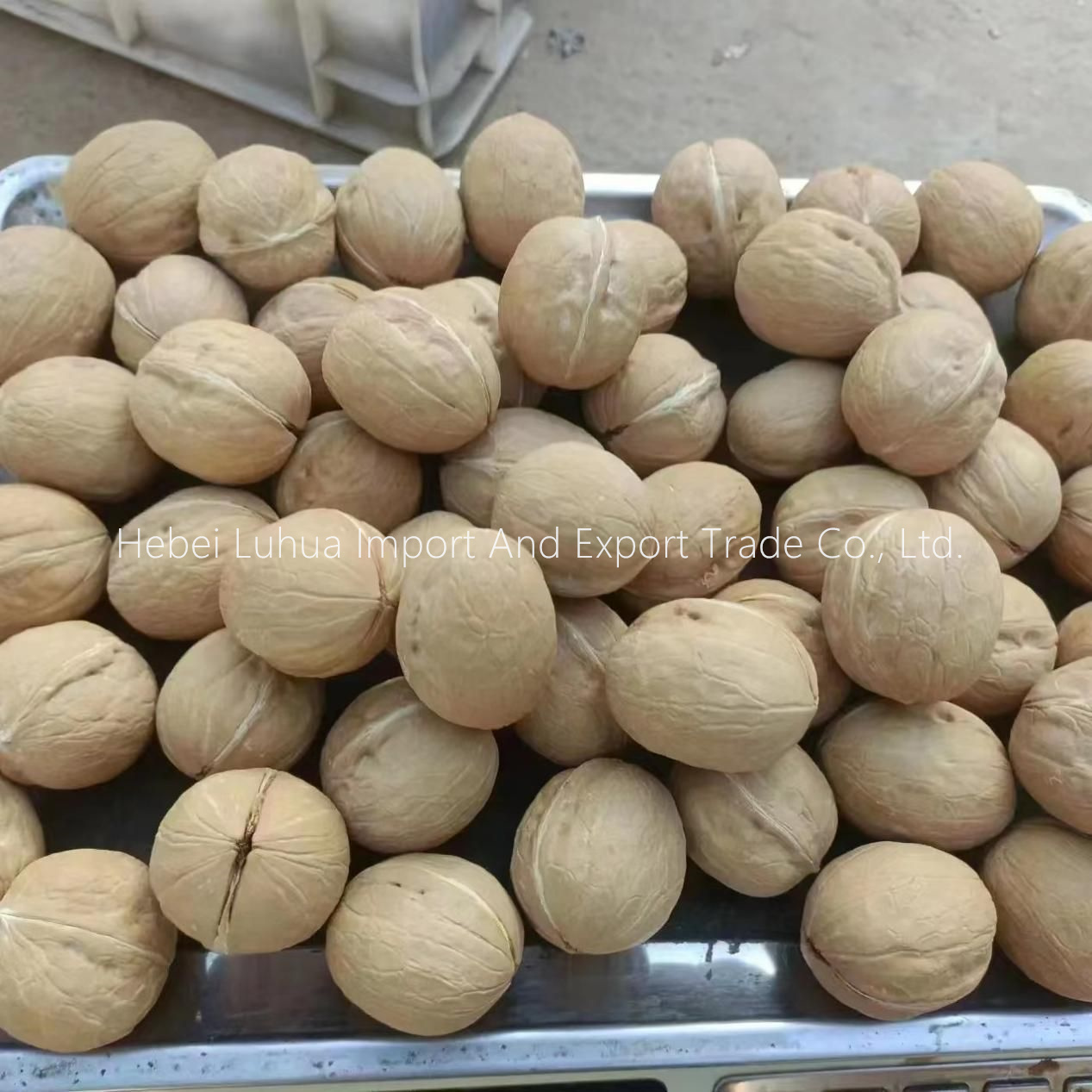Mohammad Yousuf Kakroo, 60, a walnut trader in Lagama market, the valley’s oldest walnut market in the border town Uri in north Kashmir’s Baramulla district is hopeless that he would be able to bring his kernels to the market this year.
He believes that the historic walnut market may close down anytime affecting the livelihood of thousands of traders, growers and labourers who are dependent directly on this business. Xin2 Walnut Unwashed

“As the walnuts are being exported to Indian markets from countries like Afghanistan, California, China and Chile, it has caused a major slump in rates in the market. Nobody is ready to purchase our kernels,” says Yousuf. He says that a few years back one kg of kernels was sold at Rs 1300 and now the same is being sold between Rs 650-700. “It is completely a bad time for the industry,” he says. For over a century, Uri boasts of the Lagama market where India’s finest walnut kernels are sold. Located four kilometres away from the Line of Control (LoC), Lagama village is located on Srinagar-Muzaffarabad road. The market also occupies a very important position in the current history for being India’s main contributor of walnut production. Lagama is also the only place in Kashmir having Pandit population who have not left the place despite the turbulent times.
The market opens for three months beginning from mid-August to mid-November. The walnuts of the market are supplied to the cities like Delhi, Mumbai, Kolkata, Gujarat and others. According to the traders in the market, this walnut market has been functional since before 1947 partition and has a historical connection.
“Then Uri was a part of Pakistan Occupied Kashmir (POK)’s Muzaffarabad city. The traders and growers from both sides of the LoC would carry dry fruits including walnuts to purchase and sell them,” says Ghulam Rasool Kakroo, 64, a walnut trader. The trade used to take place on horse carts through Silikote village of Hajipeer sector of Uri which is now a LoC. Silikote village is the nearest LoC to Lagama and the village falls inside the Indian fence. Some twenty families are only living inside the fence.
“The road was then called- Jhelum valley cart road. It was between Muzaffarabad’s Kohala to Uri and also connecting Srinagar and Jammu’s Ramban district,” he says. In 1857, the British government felt the need of a good road between Rawalpindi and Srinagar and requested Maharaja Ranbir Singh for construction of the same from Kohala to Srinagar. Accordingly, Maharaja started construction work after getting the survey of the road by an English engineer.
In 1880, the contract for making the bridle path into a cart road from Kohala to Baramulla and subsequently up to Srinagar was allotted. The work completed in summer of 1890 and was formally inaugurated by Maharaja Partap Singh on 10th September 1890 when his highness was driven through in the royal tonga from Baramulla to Kohala. Ghulam Rasool said that paying huge Goods and Services Tax (GST) has also affected their business.
“We have to pay 5% GST. One to the local government and another to the central government. We are poor people. We don’t earn that much and instead we have to pay more than as GST. Government should also look for ways so as to waive-off our taxes,” he says. He adds that they have to pay taxes for everything whether on purchasing of kernel boxes, packing them, fare to vehicle drivers and to other workers involved in the process.
Jameel Ahmad Budoo, a walnut trader from Uri’s Garkote village who left this work in 2019, fearing the closure of the industry. He asks the government how come are foreign countries’ kernels are better than Kashmir ones. “Our walnuts are highly rich in nutrients and oil too. Our kernels are organic and large in size too. There is no addition of chemicals in its production,” he says. He says that plucking and planting of walnuts in Kashmir is completely a hectic process. Since Kashmir has long and big walnut trees, it takes a lot of time to pluck and grow the walnuts while foreign countries have hybrid trees and plucking is done in a short period of time. There are several types of kernels available in Lagama market which includes snow white, normal white, sharbati and amber. The snow white is the costliest one among all. The Lagama market used to produce and dispatch around 40,000-45,000 tonnes of walnuts in every season. But now it has come down to 15,000-20,000, all because of the less demand.
“The remaining kernels are kept in the shops to be sold for the next year but we lack a proper storage facility which causes rust to the kernels. There is a need to have a cold storage facility. We request the government to start a scheme so that we can procure the cold storage facility,” said Shafqat Aziz, a trader from Salamabad, Uri. Over 10,000 families are dependent on this business in Uri and income per capita usually touches Rs 10-15 lakh but with less demand the income has also plummet to 3-4 lakh only. Mohammad Aamin Chalkoo, President Dry Fruits Association Uri said that authorities have never taken the Kashmiri walnut Industry seriously. “Basically, they want to choke the livelihood of the Kashmiris, especially the youngsters in this field,” he says.
“The government has never made any serious efforts to promote the Kashmiri kernels like they do in the case of apples. They go to national and international markets to promote apples. We have not been given any financial support from the government till date despite having incurred losses in crores,” he says.
Traders say that they have to pay the debts for their losses from their own pockets. Though the issue has been brought into the notice of concerned authorities but nothing has been done so far. In January, the government said that ‘UT Level Food Processing Programme for Development of Clusters for Specific Products of J&K’ is a Rs 879.75 crore initiative that aims to maximise farmer income and minimise post-harvest losses. In this, they said they will focus on the seven products from the 17 districts of the J&K. The government said it will take up the walnuts from Kupwara and Kishtwar district but have dropped the Uri. The traders in Lagama had expressed resentment over the government’s decision calling it ‘discrimination’. Being a border town, another challenge for the traders has been cross-border shelling which has affected their supply of walnuts from LoC areas in the past. Most of the walnuts are supplied from the LoC villages into the Lagama market. These villages include Charunda, Mothal, Tillawari, Hathlanga, Isham, Nawarunda, Kamalkote and others. But since India and Pakistan armies have agreed to maintain a ceasefire in February 2021, they have taken a sigh of relief.
“Earlier nobody was ready to go to LoC villages despite being paid double the amount. But now things have changed completely and we are getting the supply normally,” said Shabir Ahmad Bhat, a walnut grower whose relatives live in Mothal village of Uri, close to the LoC.
Traders demand the smooth movement of trucks carrying kernels on Srinagar-Jammu national highway as the movement is sometimes unnecessarily halted by the traffic police in winters causing huge losses. Many say that there should be a procedure of airlifting the kernels on the cheapest rates to the other parts of India. They also seek setting up of a local walnut processing unit. With traders fearing that the Lagama market may close down anytime, many say that they wouldn’t let their kids take up this job as it has no future. Several continue to pin hope on the government that if they intervene things may get normal.

Export Grade Walnut Kernels Disclaimer: The views and opinions expressed in this article are the personal opinions of the author. The facts, analysis, assumptions and perspective appearing in the article do not reflect the views of GK.